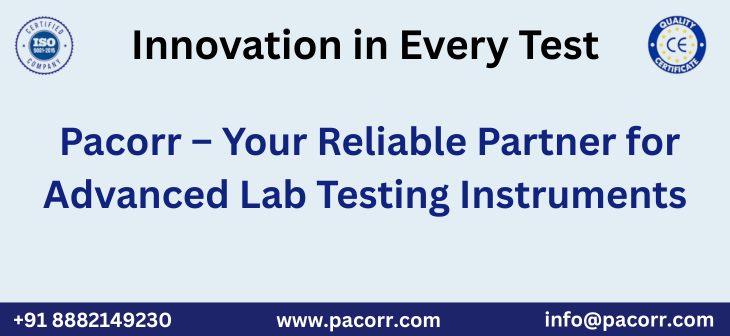
Pacorr provides a comprehensive range of high-performance tensile testing machines designed to meet the growing demands of quality assurance and research-intensive industries. As global manufacturing standards become more stringent and products are expected to perform flawlessly under diverse mechanical conditions, the role of material testing equipment in both quality control and R&D becomes increasingly vital. The tensile testing machine, in particular, has evolved into a cornerstone tool for evaluating the mechanical behavior of materials under uniaxial tension—an essential property for predicting product reliability and compliance with performance standards.
Understanding Tensile Testing in Industrial Contexts
Tensile testing involves applying a controlled pulling force to a material specimen until it breaks. This process yields key mechanical properties such as tensile strength, yield strength, elongation at break, and modulus of elasticity. These parameters help determine a material’s ability to withstand real-world stresses without deforming or failing prematurely.
Pacorr’s tensile testing machines are specifically engineered to deliver high-resolution data, enabling manufacturers and researchers to evaluate material suitability with unmatched precision. The information collected during a tensile test forms the backbone of product development, regulatory compliance, and performance optimization.
Why Tensile Testing Machines Are Essential in Quality Control
In modern production environments, quality control is not just about verifying dimensions or finishes—it’s about ensuring mechanical integrity and consistency across all manufactured units. Tensile testing plays a critical role in this process.
Ensuring Material Conformance
Using Pacorr’s material testing machines, quality control teams can confirm whether incoming raw materials or finished components meet the mechanical specifications outlined in contracts, certifications, or internal guidelines. If a batch of polymer or steel does not meet the required tensile strength or elongation, it can be rejected before entering production, saving both time and cost.
Batch-to-Batch Consistency
For industries that manufacture in high volumes, such as automotive or packaging, batch-to-batch consistency is vital. Variations in material performance can lead to failures in service, recalls, and brand damage. Routine tensile testing ensures that mechanical properties remain within an acceptable range across multiple production runs.
Non-Negotiable for Safety-Critical Applications
In sectors like aerospace, medical devices, and structural engineering, component failure can lead to catastrophic consequences. Tensile testing ensures that critical materials are evaluated to strict standards, providing documented assurance that every component will perform as required in its final application.
Tensile Testing in Research and Development
In R&D labs, the tensile testing machine is more than a quality assurance tool—it is a window into material behavior under stress. Researchers rely on accurate tensile data to innovate and validate new materials, develop lightweight yet strong composites, or simulate how products perform under real-world forces.
Developing New Materials
Modern innovation often starts at the material level. Whether it’s a high-performance polymer, an eco-friendly fiber, or a corrosion-resistant alloy, tensile testing is a foundational step in determining feasibility. Pacorr’s R&D testing systems provide the precision and repeatability required to compare new material formulations and push the boundaries of mechanical performance.
Optimization of Design Parameters
Material characteristics directly impact how a product is designed. Engineers use tensile data to refine dimensions, select compatible materials, and simulate stress conditions using finite element analysis. This data-driven approach reduces prototyping costs and shortens development cycles.
Compliance and Standard Testing
R&D teams must validate that their materials and products meet regional and global standards such as ASTM, ISO, or BIS. Tensile testing provides the required evidence for certification and approval, facilitating smooth market entry and reducing liability.
Technical Capabilities of Pacorr’s Tensile Testing Machines
Pacorr designs its tensile testing equipment with advanced features that enhance both lab and production floor performance. These systems include:
- High-resolution load cells for precise force measurement
- Digital extensometers or video extensometers for accurate elongation tracking
- Real-time data acquisition and software analysis
- Interchangeable grips and fixtures for multiple material types
- Compliance with ASTM D638, ISO 527, ASTM E8, and other global standards
Such capabilities ensure that every test run delivers reliable, repeatable, and audit-ready results.
Application Across Industries
The versatility of tensile testing machines makes them applicable across a broad spectrum of industries:
- Automotive: Testing strength and ductility of structural parts, seatbelt webbing, and under-the-hood plastics
- Construction: Evaluating the tensile performance of reinforcement bars, fasteners, and joint materials
- Textiles: Measuring stretchability and breaking point of fibers and woven fabrics
- Aerospace: Confirming the strength of high-temperature alloys and lightweight composite materials
- Electronics: Assessing the mechanical reliability of solder joints, connectors, and cable insulation
Pacorr’s flexible and durable machines are built to handle these varied requirements without compromising accuracy or efficiency.
Role in Predictive Maintenance and Lifecycle Testing
Beyond immediate material verification, tensile testing also contributes to lifecycle analysis and predictive maintenance planning. By simulating stress conditions over time, engineers can estimate a product’s useful life and identify points of potential failure long before they occur in real-world conditions.
Tensile testing data becomes especially valuable in industries that require fail-safe performance under repetitive loading, including railways, defense systems, and heavy machinery manufacturing.
Advantages of Using Pacorr for Tensile Testing
Pacorr’s leadership in mechanical property testing is based on a strong foundation of innovation, engineering excellence, and customer-focused design. Key advantages of Pacorr’s systems include:
- Precision Engineering: Accurate and repeatable data under variable conditions
- User-Friendly Operation: Intuitive software and ergonomic machine design
- Data Integration: Seamless export to quality systems and analytics platforms
- Customization: Tailored machines and fixtures for industry-specific needs
- Service and Support: Ongoing calibration, training, and technical assistance
These features make Pacorr the preferred partner for manufacturers, laboratories, and research institutions seeking reliable tensile testing solutions.
Conclusion
The tensile testing machine is no longer a supplementary tool in quality assurance—it is a strategic asset in both production and research. From ensuring that materials meet strict quality thresholds to enabling the development of next-generation products, its importance cannot be overstated. With increasing demand for safer, stronger, and more efficient materials, Pacorr’s tensile testing systems provide the confidence and clarity needed to meet those goals.
Through deep industry experience, robust design, and commitment to accuracy, Pacorr continues to empower businesses with material insights that drive better performance, product integrity, and innovation.
Thanks to Pacorr Testing instruments, we have all the required quality testing instruments that have helped us to ensure the best quality delivered to our clients.

Danish
Fair Exports Pvt. Ltd.

